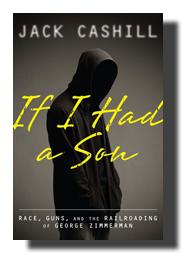Pray for George Zimmerman
Order your copy of Jack Cashill's
"If I Had a Son"
Sept 12 , 2013 - WND.com
© Jack Cashill
If there is any one person in America who knows what George Zimmerman has gone through it would likely be Clarence Thomas.
In the fall of 1991, Thomas survived the last minute allegations of former staffer Anita Hill, who had been recruited in a desperate effort to smear him, and cleared a Senate vote to be appointed to the Supreme Court.
At the time, able to see for themselves what the left and the media were doing, most Americans believed Thomas was telling the truth. In the years afterward, however, the media kept pounding away on Thomas’s presumed flaws until they had reversed the verdict, at least in the court of public opinion.
The media are doing much the same today to George Zimmerman. Dismayed by the not-guilty verdict in the shooting death of Trayvon Martin, they are trying to criminalize Zimmerman in the public’s mind if for no other reason than to save face.
The media have made Zimmerman’s speeding tickets national news stories. They made his wife Shellie a celebrity for divorcing him. They giddily turned a routine divorce spat into the Gunfight at O.K. Corral.
_____
_____
As with Thomas, fair weather supporters grow weary of defending Zimmerman. They begin to doubt their own judgment. They begin to question the story Zimmerman told and the verdict itself. They shouldn’t.
On the night of February 26, 2012, George Zimmerman left home a hard-working, tax-paying citizen, and a good one at that. His friends called him “Tugboat,” the one who always came to the rescue.
An Obama supporter, he helped a black homeless man, Sherman Ware, find justice. He was helping guide two black teens through life. He helped a terrified mother secure her house. And he had recently volunteered to serve as neighborhood watch coordinator in a crime-plagued community, a responsibility he took seriously.
When, on the way to the store he saw a suspicious person wandering in the rain looking into homes, he did as instructed. He called the police. The prosecutors held this against him. As the affidavit read, Trayvon Martin was walking back to the townhouse “where he was living” when he “was profiled” by Zimmerman who “confronted” him.
Martin, of course, was not “living” at the Retreat. He was visiting. This distinction mattered in that Zimmerman did not recognize him.
As to the profiling charge, Zimmerman did what any good neighbor should have done. That the word “profile” had become toxic in the Orwellian world of the politically correct did not make it criminal or even wrong.
As to the confronting, that was done by Martin who circled back and sucker punched Zimmerman. For his troubles, Zimmerman got his nose broken and his head bashed in. Finally, he shot and killed a seventeen-year-old, a traumatic event even for the shooter, even if in the right.
In the days that followed, the nation’s media and large, angry masses of people, most of them black, were demanding his arrest or worse. He was experiencing an existential horror Clarence Thomas might understand, but few other Americans have ever suffered.
What made it more unnerving for Zimmerman was the sense of betrayal. The very people he had worked with on the Sherman Ware case turned against him. The president he voted for all but denounced him. His arrest satisfied no one. The arrest of Shellie on perjury charges only stoked the crowd’s thirst for vengeance.
The trial promised no closure. When I met with George’s father Bob in Sanford, Florida, during the trial, he picked a place the media would not likely stake out—Hooters. He came incognito.
Although the shooting took place just a week after he suffered a heart attack, he, his wife, and his mother-in-law, an Alzheimer’s sufferer, had been forced into hiding.
I asked Bob how George managed to sleep at night. He answered, “I am not sure he does.” Bob was deeply worried about his son and doubted that even a not-guilty verdict would bring him peace.
George’s brother Robert expressed similar concern. “I still see sadness in his eyes,” he said after the verdict came down. “He was definitely not the same person I had seen a few days before the incident.”
In his battle with the Democratic-media complex, Zimmerman had few of the resources available to Thomas, including high-powered allies and the support of a stable, mature wife.
In this regard, he more closely resembles those lonely, traumatized veterans of the Vietnam War who returned from the field of battle to a public hostile to their cause, indifferent to their struggles, and eager to move on.
Zimmerman did not choose to represent us in the culture wars. The media thrust that role upon him. He does not deserve our scorn. He deserves our prayers. If we abandon him, the unthinking left and their media allies win.


